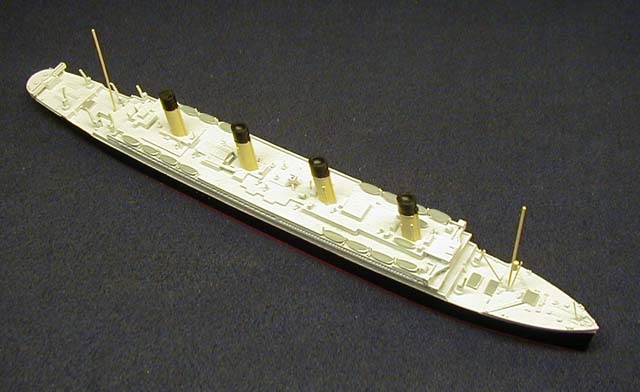R.M.S. Titanic

1912
(Carlo Marquardt CM-148)
- Type: Passenger
- Displacement: 46,329 tons
- Dimensions: 882 x 93 x 34 ft.
- Machinery: Steam triple expansion engine, triple screws = 21 knots
- Passengers: 2,603 (905 first class, 564 second class, 1,134 third class)
- Crew: 900
- Builder: Harland & Wolff, Ltd, Belfast, Ireland, 1912
- Service: Built for White Star Line. Largest liner in the world when completed. Claimed to be "unsinkable." Under the command of Captain Smith, she departed on her maiden voyage from Southampton to Cherbourg to Cobh to New York 10 Apr 1912. On 14 Apr at 11:40pm in the North Atlantic she struck an iceberg a glancing blow which opened up a 300 ft gash spanning five watertight bulkheads. Her design called for her to float with any four flooded. Though there were 2,208 people aboard, lifeboats were available for only 1,178, which met Board of Trade standards at the time. There were adequate numbers of life jackets, but they were of little use because the water was so cold. At 12:05am on 15 Apr, the lifeboats were swung out; at 12:45am the CQD distress signal was sent out, followed by the new SOS -- the first time it had ever been used. The Cunard liner Carpathia signalled she was coming at full speed, but only eight miles away an unidentified ship (rumored to be Leyland's Californian) passed by without coming to investigate. At 1:10am Titanic began settling by the head; at 1:27am the engine rooms flooded; at 1:50am the last lifeboat pulled away, although many had left only partially filled. Some 1,503 persons remained, including 688 of her crew. At 2:15am the lights went out as she submerged up to the second funnel, and by 2:30am she disappeared. Only 705 survived to be rescued a few hours later.

 Up
Up



 Up
Up